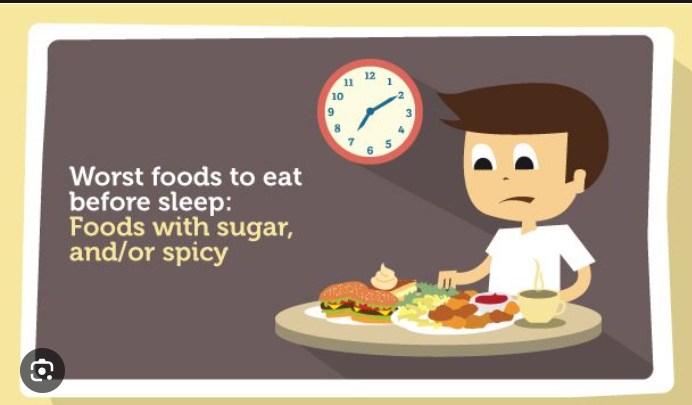Avoiding these foods before bed will improve the quality of your sleep at Bedtime
Why eating before sleep is bad at bedtime
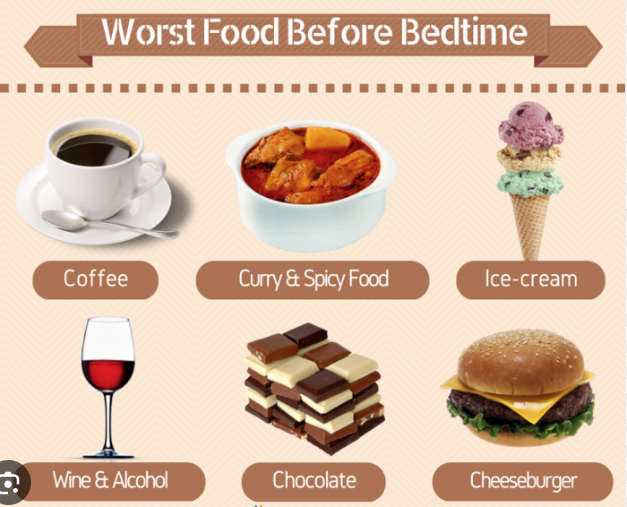
A restful night’s sleep is invaluable. Unfortunately, it’s also a luxury that many U.S. adults cannot afford, or at least, more than 25% of them, according to 2020 data from the United States Office of Disease Prevention and Health Promotion. The good news is that there are strategies to change the things we consume (or don’t eat) before bed in order to improve the quality of our sleep. This article will explain which nighttime snacks are affecting your sleep and why, as well as provide you with advice on what meals to avoid before bed.
According to Yasi Ansari, a registered dietitian and Los Angeles-based spokesman for the Academy of Nutrition and Dietetics, “the foods we eat can affect the quality and duration of our sleep.” Additionally, both nutrition and sleep have an impact on daily activities, such as energy levels or driving alertness, and insufficient sleep even raises the chance of developing diseases like diabetes and heart disease.
When to stop eating at bedtime
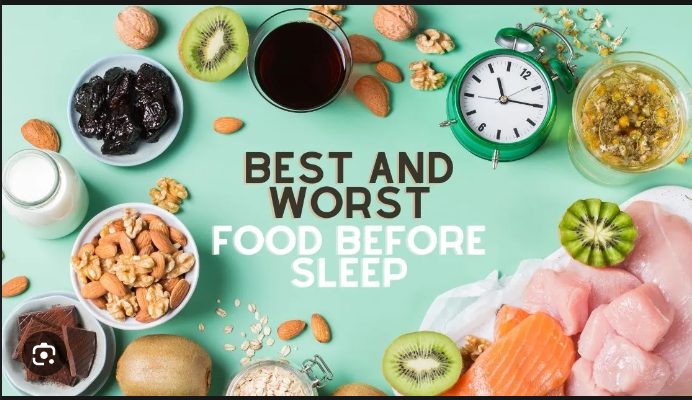
It’s crucial to consider how much and when you’re eating before you put your head on the pillow. The best strategy, according to experts, is to spread out your meals and snacks throughout the day rather than eating a big meal just before bed and obtaining most of your calories later in the day. Such a heavy dinner may stall digestion, necessitating a lot of gastrointestinal labor while you try to go to sleep.
Before going to bed, Ansari advises her customers to be aware of their portion levels. “If you are feeling uncomfortable, it is challenging to fall asleep and stay asleep. A restful night’s sleep is largely dependent on regular eating habits. Our ability to get a good night’s sleep will be impacted, for instance, if we miss meals in the morning and then feast at home later in the day.
On precisely when to quit eating before bed, advice differs. People who stopped eating an hour or less before bedtime slept for longer periods of time than those who stopped eating two or three hours before bedtime, according to a 2021 study published in the British Journal of Nutrition. According to the study’s findings, even though it is a good idea to avoid eating right before bed, you might not need to stop indulging altogether at that time.
How to deal with late-night cravings
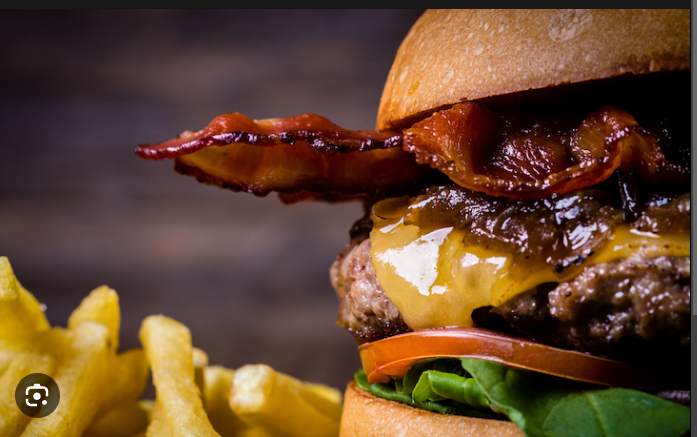
Just because it’s smart to avoid late-night snacking before bed doesn’t mean it’s easy. Avoiding night snacking may mean taking some time to get to know yourself and your hunger queues, says Cordialis Msora-Kasago, a registered dietitian nutritionist and founder of Maitano Nutrition and Lifestyle Medicine in Menifee, California.
“Before grabbing a snack right before bed, ask yourself if you are really hungry,” says Msora-Kasago. “Oftentimes hunger pangs that occur after dinner or the last meal of the day occur not necessarily because you are physically hungry, but because you are bored, stressed, tired, or yes, even sleepy.” She adds that sometimes, after reflecting on why you might have the urge to snack, you may find that you are physically hungry.
Spicy foods and other foods that cause acid reflux
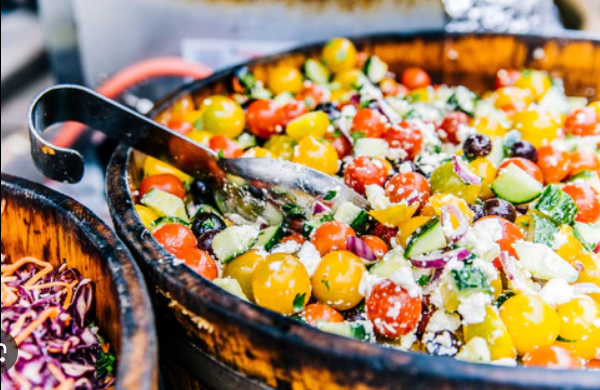
Spicy foods may cause or exacerbate heartburn, which may feel worse when resting flat, such as on your back as you sleep. This is due to the fact that gravity interferes with the body’s capacity to drive food through the digestive tract when one is lying down. Avoiding spicy foods before bed can help lower the risk of heartburn, or at the very least, it can be a good idea to wait a few hours before lying down for those who have acid reflux disease or gastroesophageal reflux disease.
“If someone experiences acid reflux from spicy foods and lies down right after eating spicy foods, the acids from the stomach can flow back into the esophagus more easily, causing a burning sensation in the chest, which may disturb sleep,” says Jessica Clifford, a registered dietitian nutritionist and research associate in the department of food science and human nutrition at Colorado State University.
Alcohol
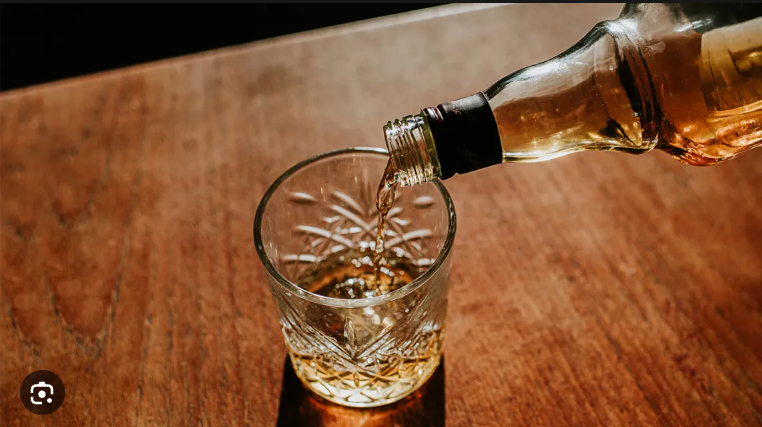
Alcohol can make some individuals feel drowsy or cause them to go to bed sooner, but Msora-Kasago claims that this does not translate to deep sleep. Some people may fall asleep more quickly after drinking alcohol. However, aside from other health issues, it is not a sleep aid.
That’s because it might have a detrimental impact on how well you sleep. According to Clifford, it disrupts the most restorative phase of sleep (known as REM sleep), making a person feel groggier and less refreshed in the morning. “A restorative rest becomes illusive,” claims Msora-Kasago. Ansari claims that the chemical adenosine is increased by alcohol, which is one cause of the restless nights. Although it initially aids in inducing sleep, after the body’s amount of the chemical declines, you’re more likely to wake up in the middle of the night.
Fatty foods
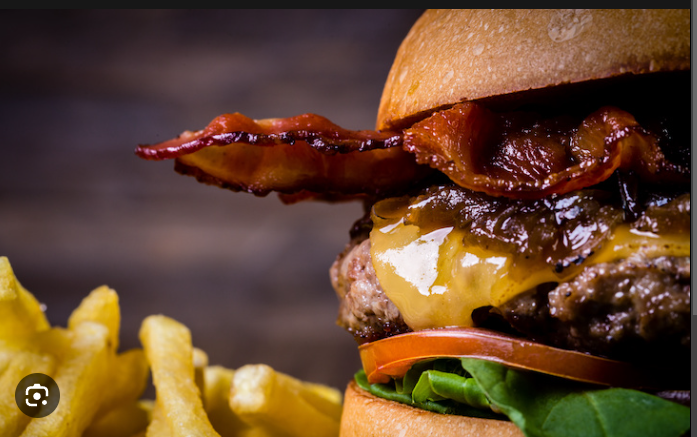
High-fat foods, particularly those high in saturated fat, require longer to digest. For some people, this might have an impact on their sleep. According to Marie-Pierre St-Onge, a director at Columbia University Irving Medical Center in New York City who has researched the effect of nutrition on sleep quality, consuming more fat and less fiber is linked to sleep that is not deep or restorative.
So it’s probably not a good idea to eat a hamburger and fries right before bed, according to Ansari. She advises having the fries early in the day and picking lean pieces of meat without spicy sauces for dinner if you’re seeking that mix.
Avoid eating and drinking these before bed.
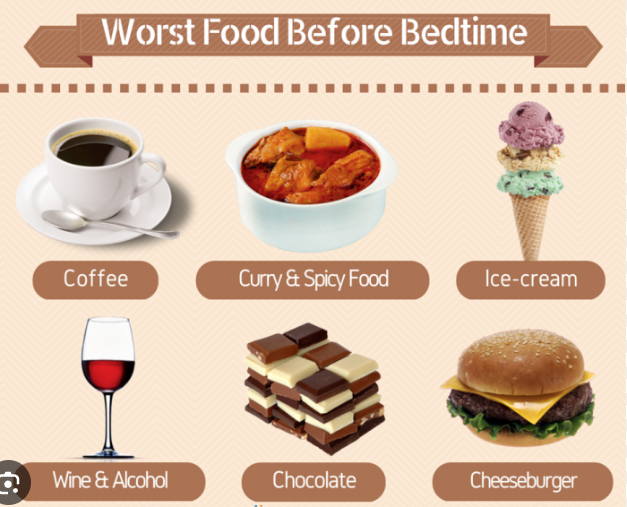
- Big meals.
- Spicy foods and other things that cause heartburn
- Alcohol.
- Caffeine.
- Fatty foods.
- Sugar.
- Phlem-causing foods.
- Lots of fluids.
Also read-Soft Foods And Recipes Safe For Post Dental Surgery
Images source: Google







